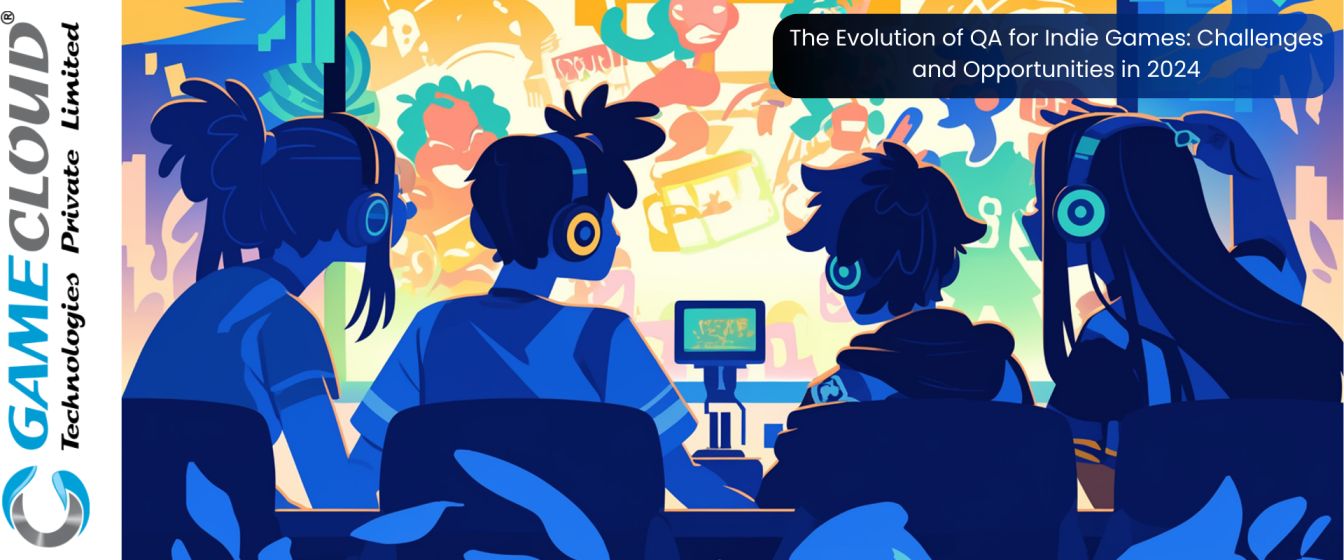
In 2024, the indie game development landscape is evolving rapidly, with developers leveraging both new opportunities and facing fresh challenges. Indie developers now have greater access to distribution platforms like Steam and mobile app stores, reaching global audiences with relative ease. However, the complexity of game environments, cross-platform compatibility, and the sheer volume of releases make delivering a polished product more challenging than ever.
QA plays a critical role in ensuring these games are successful. For indie developers working with smaller teams and budgets, QA is essential for identifying bugs early and delivering a smooth user experience. As games grow more complex, especially with innovations like AI-driven environments and cloud gaming, robust QA processes ensure these intricate elements perform reliably across different devices. This not only helps games stand out in a crowded market but also helps developers manage player expectations, especially with the increasing demand for cross-platform play and consistent quality.
Challenges in QA for Indie Games
In 2024, Indie game developers face several significant challenges with Quality Assurance. One major issue is the limited number of qualified professional resources. Indie studios often operate with smaller teams and budgets, making it hard to allocate enough for comprehensive QA efforts. This can result in missed bugs or limited testing, which affects the game’s overall quality. Industry reports suggest that indie studios spend less on QA than larger studios, putting them at a disadvantage when it comes to thorough testing.
Another challenge is discoverability and time constraints. Indie developers often work with tight schedules, which forces them to focus on the most critical areas for testing, while other issues may remain unaddressed. In a crowded market, releasing a bug-free game is essential for visibility and reputation.
Fragmentation across platforms is another hurdle. With games launching across consoles, PC, and mobile, ensuring compatibility and performance across multiple devices requires more extensive QA, which can be difficult for small teams to manage.
Opportunities and Innovations in QA for Indie Games
Indie developers are embracing innovative strategies to overcome QA challenges. One of the key advancements is the adoption of AI and automation. AI-powered testing tools allow studios to automate repetitive tasks like regression testing, which helps indie teams manage larger workloads with fewer resources. These tools also enable faster bug detection, making the QA process more efficient.
Another effective strategy is community-driven QA. Indie developers frequently use beta testing and early access platforms to involve players in the QA process. This approach not only provides real-time feedback but also helps developers identify bugs in diverse, real-world gaming environments. Platforms like Discord and Steam are popular for engaging early adopters.
Finally, shift-left testing and integrated QA are becoming essential for indie studios. By incorporating QA early in the development cycle, developers can catch and fix bugs sooner, saving time and reducing costs. This proactive approach ensures a higher-quality game upon release.
From Concept to Success: GameCloud’s Comprehensive QA Solutions
At GameCloud, we go beyond traditional video game testing, QA, and QC. Our goal is to ensure your game runs flawlessly, supports your monetization strategy, and delivers a great experience for players at every stage. Drawing on years of industry expertise, we’ve crafted services that benefit game developers and publishers worldwide. From the initial concept and prototype to post-launch support, we’re committed to contributing to your game’s success, making sure it thrives long after release.
Conclusion
In conclusion, as the indie game industry continues to grow, evolving QA practices are essential for ensuring games meet player expectations and stand out in a competitive market. Embracing new technologies like AI and automation, along with community-driven testing, can enhance game quality, improve efficiency, and foster long-term success for developers.
For Know More Contact-Now
FAQs for: The Evolution of QA for Indie Games: Challenges and Opportunities in 2024
Why is QA critical for indie game development in 2024?
Quality Assurance (QA) is essential for indie developers to ensure their games deliver a smooth and polished user experience. With the increasing complexity of modern games, including cross-platform compatibility and AI-driven environments, robust QA helps detect and fix issues early. This process enhances game quality, improves player satisfaction, and ensures the game meets the expectations of a competitive market.
What are the main challenges indie developers face in QA?
Indie developers often face limited budgets and smaller teams, making it difficult to allocate sufficient resources for comprehensive QA. Other challenges include managing time constraints, addressing platform fragmentation, and ensuring compatibility across consoles, PCs, and mobile devices. These factors can lead to missed bugs or reduced testing coverage, potentially impacting the game’s quality and reputation.
How can indie developers address QA challenges despite limited resources?
Indie developers can adopt innovative strategies like AI-powered testing tools to automate repetitive tasks and streamline the QA process. Community-driven QA through beta testing and early access platforms is another effective approach, allowing developers to gather real-world feedback from players. Incorporating shift-left testing by integrating QA early in the development cycle can also save time and resources while ensuring a higher-quality product.
What role does community-driven QA play in indie game development?
Community-driven QA involves engaging players in the testing process through platforms like Steam, Discord, or early access programs. This approach provides valuable real-world feedback, helps identify bugs in diverse gaming environments, and builds a loyal player base. By involving the community, developers can address issues more efficiently and enhance the game’s overall quality before its official release.
How does GameCloud support QA for indie game developers?
GameCloud offers comprehensive QA solutions tailored to the needs of indie developers. From concept to post-launch support, GameCloud provides services that include functional, performance, and compatibility testing. With expertise in AI-driven tools and a focus on early-stage QA integration, GameCloud ensures indie games are optimized for performance, meet industry standards, and deliver an exceptional player experience.
